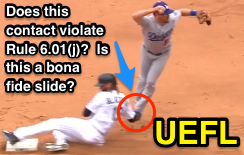The Play: With none out and two on (R1, R2) in the bottom of the 5th inning, Rockies batter DJ LeMahieu hit a 1-0 changeup from Dodgers pitcher Hyun-Jin Ryu on the ground to third baseman Justin Turner, who threw to second baseman Logan Forsythe as Rockies baserunner R1 Charlie Blackmon slid into second base.
 |
| U2 Cederstrom observes Blackmon's slide. |
After observing replays indicating contact between Blackmon's right hand and Forsythe's left foot, Dodgers color commentator Orel Hershiser opined, "That would be slightly ticky-tac."
Analysis: As a matter of bookkeeping, it is important to make the distinction between pre-2016 interference 6.01(a)(5) and aforementioned bona fide slide rule interference 6.01(j). The reason for this technical distinction is that 6.01(a)(5) is not reviewable via Replay Review, while 6.01(j) is subject to video review, though as we'll discuss in a moment, it doesn't much matter.
OBR 6.01(a)(6), by the way, states, "If, in the judgment of the umpire, a base runner willfully and deliberately interferes with a batted ball or a fielder in the act of fielding a batted ball with the obvious intent to break up a double play, the ball is dead. The umpire shall call the runner out for interference and also call out the batter-runner because of the action of his teammate. In no event may bases be run or runs scored because of such action by a runner."
Even though "willful and deliberate" interference [6.01(a)(6)] is not reviewable, that fact is rather superfluous. The standard for declaring an extra out for violation of the bona fide slide rule is less than it is for "willful and deliberate" interference.
As we detailed as part of our introduction to 2016's new bona fide slide FPSR rule, there are four criteria under 6.01(j) which the runner sliding into the base must satisfy in order to be considered legal. As relates to Blackmon's actions, they are:
1) Begins his slide and makes contact with the ground before reaching the base - YES;
2) Is able and attempts to reach the base with his hand or foot - YES;
3) Is able and attempts to remain on the base (except home) after completing the slide - YES; and
4) Slides within reach without changing his path for the purpose of initiating contact with a fielder - ?.
 |
| Upon review, this slide was deemed illegal. |
Rule 6.01(j) continues, "A slide shall not be a 'bona fide slide' if a runner engages in a 'roll block,' or intentionally initiates (or attempts to initiate) contact with the fielder by elevating and kicking his leg above the fielder’s knee or throwing his arm or his upper body."
 |
| Crew Chief Cederstrom announces the call. |
In accordance with the penalty for interference, Rockies baserunner R2 Kyle Freeland was returned to second base and, with two out, did not score; Dodgers first baseman Scott Van Slyke was credited with the second put-out on batter-runner LeMahieu. In the end, it made little difference, as Colorado won the game, 2-1.
Video available via "Read more"
Alternate Link: Blackmon's hard slide into second base results in an interference call (LAD)












